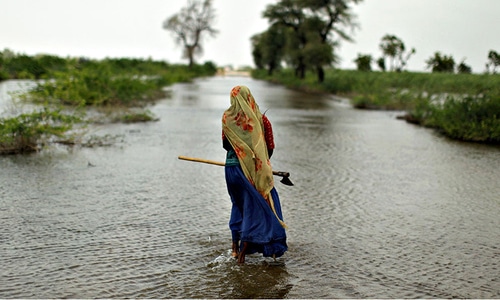There is no denying that one of the most horrific and existential problems facing our planet Earth in the twenty-first century is climate change. Financially speaking, climate change is exemplified by weather variations and unforeseen natural disasters; the flood of 2022, for example, severely damaged Pakistan’s economy, costing the country thirty billion US dollars. Politically speaking, a large number of academics and specialists in international law believe that nations may soon go extinct as a result of sea level rise brought on by climate change. The aforementioned academic perspective is shown by the vulnerability of the Maldives as an island nation in the Indian Ocean. From a humanitarian perspective, the millions of people who have been uprooted—including women and children—have caused irreversible harm to mankind.
In contrast, Pakistan and other developing nations are more vulnerable to the effects of climate change. About 17,000 schools in Sindh province were destroyed by the flooding in 2022. Weak or emerging states have the issue of being ill-prepared for heavy downpours and other events. In this sense, developed economies are more robust. Remarkably, Pakistan’s contribution to GHG is less than 0.5%. Unfortunately, Pakistan is one of the top five countries most affected by climate change, which is damaging the ecology.
Pakistan, as well as many other poor countries, are strong supporters of climate justice. Developed and poor nations initiated a campaign to highlight their frustrations and misgivings about climate change at different international venues, including the United Nations. Actions to mitigate the devastating consequences of climate change, in comparison to the horrendous consequences of climate change, are only the tip of the iceberg. The annual Cop submission (a meeting of parties) is more about snapping group selfies than taking serious and effective steps to combat the threat of climate change.
A previously anticipated endeavor in terms of the loss and damage fund has yet to materialize. Apathy on the part of affluent countries and responsible stakeholders may create a sense of helplessness in climate-affected countries. Crises have left nations with few alternatives as indifference and unwillingness among responsible governments (the United States, China, the United Kingdom, France, and so on) have increased. Aside from the zero-sum game of the international system, patriarchal and misogynistic tendencies exacerbate the suffering of already marginalized and oppressed women in our communities.
Many data points show that women continue to be the most susceptible and impacted section of our society as a result of climate change. Torture, both physically and emotionally, exacerbates the situation and makes it difficult for women to deal with the inhumane consequences of climate change. The disastrous years of 2022–2023 caused by climate change, combined with an already unstable condition of our economy, left the government with few alternatives except to rely on God for all vulnerable and climate-affected individuals, particularly women.
With the support of Western funders, Islamabad will be unable to hear women’s concerns. Their (women’s) reliance further harmed their abilities; reports also reveal suicidal inclinations in women, particularly during times of crisis such as flooding, severe rains, and mass migration. Last year, floods put more than 650,000 pregnant Pakistani women at God’s mercy. Furthermore, they were unable to access the healthcare system.
Newborn kids who grow up in such a deplorable environment would undoubtedly suffer from ailments such as malnutrition. Vegetables and fruits: These unstable youngsters will become a problem rather than an advantage to the country. Because of their mental and physical illnesses, they will be unable to contribute adequately to the country’s progress. More than 33 million people were uprooted by last year’s flooding, which I would describe as devastating. Unfortunately, women accounted for 80% of the aforementioned total (33 million).
The vast majority of them were unable to migrate, rebuild, or resume their lives. To deny that women in Pakistan are more or less equal to men (49–51%) will be devastating for Pakistan’s future and a historical miscalculation on our side, affecting not only our economy but also our politics, society, and international or global position. A single state cannot advance if half of its assets and personnel are excluded. If we return from a condition of pessimism, as we have previously demonstrated in terms of facts and data, there is also a layer of optimism.
To alleviate the unpleasant effects of climate change, the Pakistani government has collaborated with the International Union for Conservation of Nature and other concerned groups, as well as the competent authorities, on a national climate change gender action plan. Despite engagement with global players, gender inequity remains, which is a source of great worry. Sherry Rahman, Pakistan’s previous climate minister, also raised the problem of climate change’s enormous impact on women in comparison to their male counterparts. It was, in itself, a good reflection that women are leading such an imperative and sensitive ministry.
The ministry for Climate Change was supervised to ensure the implementation of provisions derived from a much-collaborated effort by Pakistan, coupled with international organizations as well as other stakeholders. The above-mentioned gender-responsive action plan was based on four comprehensive themes: capacity building, policies and management mechanisms, gender balance, and adaptation and mitigation.
Pakistan’s commitment to climate change is evident in its comprehensive approach, emphasizing women’s empowerment. The country’s main strategy is adaptation measures involving women in local farming. Governments and international bodies can help organize women in rural areas to control climate change. Women need adequate knowledge and skills to fulfill their duties. Besides governmental responsibilities, individuals have a duty to address women’s empowerment. Society is the foundation of Pakistan, and the negation of patriarchal and misogynistic thoughts is crucial. Accepting the full potential of women is essential for effective climate change governance.
National or domestic anti-climate change regimes require international assistance to be viable. Parties to the UNFCCC have the potential to mitigate climate change effects by introducing resilient regimes and a CO2 tax. However, developed economies, particularly the US, China, and India, are developing or boosting their economies at the expense of weak states. The world’s two largest polluters contribute over 50% to greenhouse gas emissions, but climate-hatted countries receive less assistance than celebrities like Cristiano Ronaldo and Messi.
The ongoing Cop-28 summit must ensure the materialization of a loss and damage fund for countries like Pakistan to combat climate change. This will help heal the climate and heal wounds. Pakistan must use foreign assistance seriously to maintain international trust and utilize it effectively. Former Pakistani foreign minister Bilawal Bhutto Zardari believes every problem creates an opportunity.
Pakistan has the opportunity to make devastated infrastructure, such as roads, railways, hospitals, and schools, resilient. By promoting eco-friendly activities, nature will never betray us. The gender-specific action plan should extend beyond climate mitigation governance, focusing on gender equality. As social animals, we can live a healthy life in our natural existence, working on a skill basis rather than a gender basis. Accepting diversity will help us cope with existential problems and promote a more inclusive society.
In conclusion, while something is better than nothing, Pakistan’s reaction in this area is inadequate. We should do more to help our most vulnerable citizens, particularly women. We should do all it takes in partnership with the international community to truly embody the spirit and duty of being a state.
Khadija Asif
Khadija Asif is an M.Phil. student at Punjab University, Lahore. Her domain of interest is artificial intelligence, non-traditional threats like climate change, International Affairs and power dynamics. She can reached via email deejukhan2504@gmail.com
- Khadija Asif#molongui-disabled-link
- Khadija Asif#molongui-disabled-link












